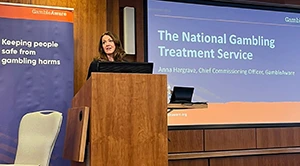 More than 52,300 individuals reached out to find help via the GamCare-run National Gambling Helpline in 2023, new data revealed. This figure towers over the 42,000 calls reported for 2022, marking an overall increase of 24%. As reported by The Independent, this December was especially busy for the helpline: the figures suggest that 39% more people called in comparison to December 2022, with many of the calls having been made by individuals seeking help for someone they knew was struggling with gambling harm. In addition, a significant number of problem gamblers reached out to share that watching television with their families proved to be difficult due to how many gambling ads were being aired throughout the holiday period.
More than 52,300 individuals reached out to find help via the GamCare-run National Gambling Helpline in 2023, new data revealed. This figure towers over the 42,000 calls reported for 2022, marking an overall increase of 24%. As reported by The Independent, this December was especially busy for the helpline: the figures suggest that 39% more people called in comparison to December 2022, with many of the calls having been made by individuals seeking help for someone they knew was struggling with gambling harm. In addition, a significant number of problem gamblers reached out to share that watching television with their families proved to be difficult due to how many gambling ads were being aired throughout the holiday period.
Claire Murdoch, mental health director of the National Health Service (NHS) England, addressed the data, beginning by describing gambling addiction as a “cruel mental health condition” which is capable of destroying lives. She also stressed that the NHS runs 12 gambling harm clinics in order to help in treating gambling harm. According to Murdoch, the April 2022 to March 2023 period saw 1,389 referrals being made to NHS gambling clinics. This underscores a pattern of the number of referrals increasing on an yearly basis, as referrals did not exceed 1,013 in 2021-22, and only 785 were made in 2020-21. She concluded by urging those who are victims of gambling addiction to reach out.
GamCare Head of Remote Support Services Samantha Turton noted that while small increases were something the organisation is accustomed to, 2023’s figures show a “landmark climb” in terms of calls. What is more, Turton claimed that despite the data being a cause for worry, more calls than in previous years were made by individuals whose gambling addiction was still in its early stages.
Prevention is Key
 Anna Hargrave, who serves as GambleAware’s chief commissioning and strategy officer and who also commented on the matter, drew a connection between last year’s launch of the National Gambling Support Network and the figures. She continued, underscoring how crucial services surrounding prevention and early intervention are. According to Hargrave, once the statutory levy proposed in the Government’s Gambling White Paper is in effect, such services will need to be a top priority in terms of funding.
Anna Hargrave, who serves as GambleAware’s chief commissioning and strategy officer and who also commented on the matter, drew a connection between last year’s launch of the National Gambling Support Network and the figures. She continued, underscoring how crucial services surrounding prevention and early intervention are. According to Hargrave, once the statutory levy proposed in the Government’s Gambling White Paper is in effect, such services will need to be a top priority in terms of funding.
This sentiment reflects GambleAware’s official response to the statutory industry levy consultation issued earlier this month. As previously reported by Casino Guardian, the CEO of GambleAware, Zoë Osmond, urged for the prioritisation of prevention when it comes to funding and that, should that not be possible, prevention and treatment must be allocated the same amount of funding. Additionally, Osmond proposed for a single Prevention and Treatment Commissioner to be appointed.
The UK Gambling Commission also called for “wider funding for research, prevention, and treatment” in its series of recommendations addressed to the Government regarding the Gambling White Paper’s statutory levy proposal. An emphasis was made on what other aspects of the statutory levy was lacking in, in general, with a focus being placed on issues such as gambling advertising and sponsorships and how they can be better regulated, illegal gambling, and more.
- Author


